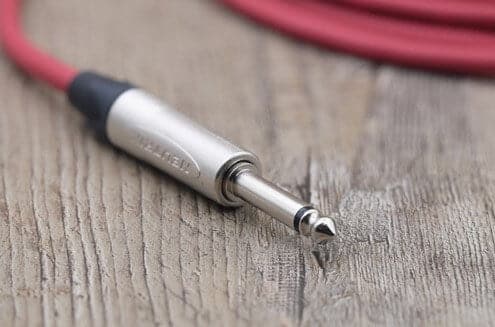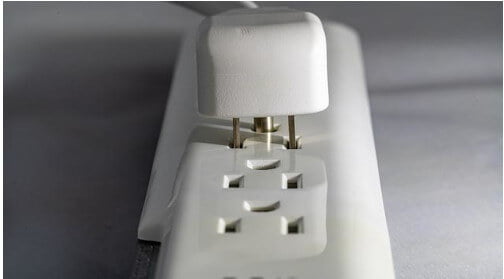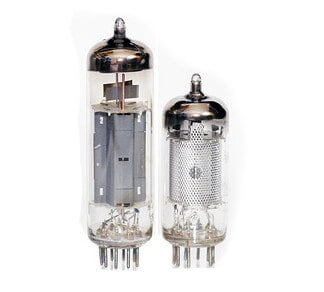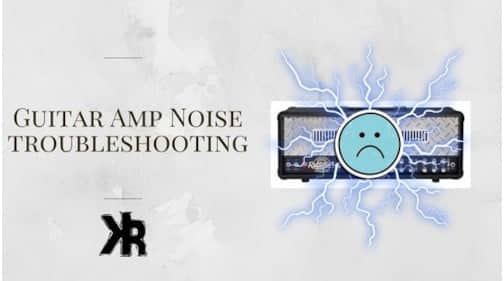Table of Contents
There is nothing worse than unwanted noise. Especially when it’s being amplified through your electric guitar rig. Whether it’s a hum, buzz, or popping, it can interrupt a great session or practice.
Not all noises will require a technician to fix. A good number of them can normally be resolved with simple troubleshooting techniques.
This Killer Rig article will take you through some of the most common issues. It will offer some guitar amp noise troubleshooting to help get you sounding great again.
Noises That Are Normal
Before we begin, it’s important to touch on the noises that are normal. The electric guitar is an instrument that involves many different parts.
And some make noise by their very nature. Some of these noises are not something that you can remove, and will just have to live with them.
Single-Coil Pickups
Do you have an electric guitar with single-coil pickups? Then you will experience some level of electrical hum and buzz.
This is caused by the sensitivity and design of the coil and is perfectly normal. In some environments with noisy power or certain types of lighting, the buzz can be quite bad.
The only way to remove this type of noise would be to change the pickups to a different kind, such as humbuckers. Some companies also make single-coil pickups that are noiseless.
They can be a great upgrade. But if you are just using regular old, vintage-style pickups, you can expect noise.
High-Gain and Distortion Amp Settings
Are you using an amplifier with a lot of distortion or running the preamp gain very high? Then some noise is also to be expected. The reason for this is that when you start overloading the stages in your amp.
This will introduce all kinds of distortion and artifacts into your signal. This can be expected when your amp settings are turned up high.
This can also be expected in distortion pedals that can be plugged into the front of your amplifier. When turned on, the noise floor as well as other artifacts from the circuit will be amplified.
This is normally a hissing sound also known as white noise. As you turn the gain higher, the hissing will increase.
Sometimes you may even experience squealing sounds. But this can be remedied with the proximity between the guitar and amplifier. The closer to the amplifier the guitar is, the more the feedback will produce squealing.
Most of these hissing sounds from high-gain circuits can be fixed by using a noise gate. This device can be put into your signal chain, which will quiet down any hissing noises when you are not playing.
When you do start playing, it will open up and allow your signal to pass through unaltered.
Some sophisticated noise gate pedals can be used. They can learn the sound of the hissing and only open when it hears your guitar playing.
This can be a great option if you have trouble with regular noise gates cutting off your sound. Especially when you don’t want them to.
Noises That are Not Normal
We’ve gone over some of the noises that are to be expected, let’s start troubleshooting the ones that are not.
As mentioned before, there can be many different causes of noise coming from a guitar. We will go over some of the most common reasons below.
Bad or Faulty Cables

One of the most common causes of noise in an electric guitar setup is bad or faulty cables.
If a cable in your rig has a loose or broken connection, it can cause all kinds of strange noises. This includes crackling and popping sounds, and even complete loss of signal.
If you have a cable that is starting to go bad, it will usually show some signs before it completely fails. These can include crackling sounds when you move it around or wiggle it.
Or even intermittent signal dropouts. If you notice any of these symptoms, it’s best to replace the cable as soon as possible. Well before it fails completely.
Bad cables can also cause problems with your amplifier or other pedals in your signal chain. Are you having strange issues with your amp?
Then it’s always a good idea to check all of your patch cables first before anything else.
Loose Connections
Loose connections can also cause odd noises. This can be anywhere in your signal chain, from your guitar’s output jack to the input of your amplifier. If you have a loose connection, it can cause crackling sounds and loss of signal at random times.
To fix this issue, simply tighten up all the connections in your signal chain. This includes the jack on your guitar, any patch cables, and the input on your amplifier.
If you have a pedal board, it’s also a good idea to go through and make sure all the connections are tight. Loose jacks can be a common problem on pedal boards since they get a lot of use.
It’s also possible that there are wires with bad connections that might need a quick solder job. If you’re experienced with this type of thing, it’s worth a look.
We have an article that will help you diagnose guitar noises here!
Interference from Other Electronics
Another common cause of guitar-related noise is interference from other electronics. This can be anything from RF to electromagnetic interference.
RF interference is usually caused by things like cell phones, routers, and microwaves. Do you have any of these devices near your amplifier or guitar?
They can cause crackling sounds or static in your signal. Especially with tube amps!
Electromagnetic interference can be caused by power lines, fluorescent lights, and electrical outlets. If any of these types of things are near your amplifier or guitar, it can cause a humming noise in your signal.
The best way to resolve this issue is to move your amplifier and guitar away from any electronic devices. Anything that could be causing interference. If you also have a pedal board, it’s also a good idea to move it away from any noisy electronics.
Bad Grounding
Bad grounds can also cause a lot of noise issues in audio gear. This can be caused by a number of things. But the most likely culprit is an improper ground connection on your amplifier.
If your amplifier has an improper ground connection, it can cause several problems. This includes a humming noise in your signal.
It can also include crackling sounds, static, and even safety issues! Tube amps can be affected by this the most, as the ground connection is very important to noise reduction.
To fix this, make sure that your amplifier is properly grounded. Does your amplifier use a removable IEC-style power cable? Try swapping it with one that you know is working. Sometimes a cable can become damaged without showing any signs on the outside.
If you’re not sure how to do this, it’s best to consult a qualified technician. Especially if your cable cannot be removed and is hard-wired to the amplifier.
Ground Loops
Ground loops can also cause noise. Normally when multiple pieces of gear are connected together.
Adding many guitar pedals to an amplifier’s signal chain, for example. They might not play well together.
This is quite common when connecting XLR audio outputs to mixing consoles. Normally, gear will come with ground lift switches. This can be handy when a ground loop is created between pieces of equipment. If your amp has one, it might solve your issues.
Noisy Power Source
A noisy or dirty supply source can also be a cause of problems. This can be anything from a power strip to a wall outlet.
If you are using a power strip, it’s important to make sure that it’s rated for the proper voltage and amperage. If it’s not, it can cause all sorts of problems. Things like crackling, weak performance, and even damage to your guitar amplifier.
Some power bars are inherently noisy when used with guitar amplifiers. If you are using one, try plugging directly into the wall and see if the noise goes away.
If you’re using a wall outlet, it’s a good idea to verify that it’s properly wired and grounded.
When they are not, it can cause the same problems as an improper ground connection on your amplifier. They can also make the amplifier sound like it’s starved for power!
When experiencing these issues, try plugging your amplifier into another wall outlet. Some buildings are not wired correctly. Or they are very old, in which case the power is not adequate for your amplifier.
Another way to try and eliminate noise from gear in buildings with bad power is to use a conditioner. These are devices that remove noise and deliver clean, noise-free power. Furman makes some power conditioner units that you might want to use.

Improper Shielding
When your gear is not properly shielded, noise can creep in. This can be caused by several things. But the most common culprits are bad cables and guitar cavity shielding.
Are you using a cable that is not shielded properly? It’s might be letting outside interference into your signal.
The best way to fix this is to make sure that you are using high-quality cables. They may cost more, but they will save you a lot of headaches in the long run.
Making sure your cables are plugged in correctly is also something to watch for. Some cables will require one specific end to be plugged into the amplifier. If they are reversed, then you will not have the same level of shielding.
Proper guitar cavity is shielded correctly is also important. This can be done in a number of ways, but the most effective is by using copper foil tape.
If you have questions about shielding, it’s best to consult a qualified technician. They can help you make sure that everything is done correctly for the best results.
Bad Vacuum Tubes
Using a tube amplifier? If so, then bad vacuum tubes can also be the cause of annoying noise. This can manifest itself in a number of ways, but ordinarily, it’s a crackling noise.
Bad vacuum tubes can also cause high-pitched sounds. Even microphonics, humming, buzzing, random signal dropouts, and even complete failure.
Do you suspect your amplifier’s noise problems are caused by bad vacuum tubes? The best thing to do is to take it to a qualified technician and replace them.
If you are experienced with changing them, then tapping on the preamp tubes can help. This can help find any that are possibly noisy or microphonic.
Also, when power tubes get older, they begin to drift and change. Especially their bias characteristics. When tubes are no longer matched correctly, noise can develop. So if your tubes are quite old, and you have some odd noises, you may want to change them.

Dirty or Corroded Connections
Another cause of amplifier noise is dirty or corroded connections. This can happen anywhere in your signal path, from the input to the output jack.
The best way to clean these types of connections is to use contact cleaners. This stuff can be found at most electronics stores.
It will do a great job of cleaning the connections without damaging them.
Once you have cleaned the connections, it’s a good idea to re-solder them. This will ensure that the connection is solid and will help to prevent future problems.
Are you having trouble tracking down the source of the noise? Then it’s a good idea to take your amplifier to a qualified technician. They will be able to locate the problem and fix it quickly.
Guitar Amp Noise Troubleshooting Tips
If you don’t have a lot of troubleshooting skills, that’s ok. here are a few tips to help you find your issues if they are relatively easy.
- Remove all cables from your amp. This will help you determine if it’s the amp or something else.
- Plug in one thing at a time. First start with your guitar, if the noise is gone, plug in another device. Once it returns, you know what is causing the issue.
- Try different cables. Sometimes it’s as simple as a bad cable that looks fine on the outside.
- Wiggle cables at connections. Sometimes bad solder joints can cause noise.
- Try using different outlets in other rooms. If one room has bad wiring, it can create noise problems.
- Try using shorter cables. Long patch cables can pick up more noise. So if you don’t need long cables, it’s best not to use them.
- Make sure all your gear is plugged into the same power bar if you are using one. This way, you are not creating ground loop issues by using multiple circuits in your house.
- Try tightening all screws on your amplifier or speaker cabinet. Sometimes when the wood dries out, things can begin to rattle and buzz.
Conclusion
Several things can cause noise in your amplifier. If you’re experiencing amplifier noise, the best thing to do is to start with the easy stuff first. In most cases, it’s something simple, like a bad cable or connection.
The process of elimination is always helpful when trying to find noise issues. Especially if you have a very busy pedal board connected to your amp!
If none of these things help eliminate the noise, then there may be something else wrong. Something that will need to be looked at by a professional repair technician.
FAQs
Why is my guitar amp making a buzzing noise?
There are many potential causes for a guitar amp to make a buzzing noise. The most common causes are improper grounding, unshielded cables, and bad vacuum tubes. Plus dirty or corroded connections.
Other potential causes could be something more serious. Such as a problem with the amplifier itself. You should also look at your guitar as being a possible offender.
For example, are your pickups the source of the noise? Does the noise go away if you unplug the guitar from the amp?
Why is my solid-state amplifier crackling?
Solid-state guitar amps will present noise issues when you have improper grounding. Also, look for bad cables and dirty or corroded connections.
Have you verified that the connections and other devices are not the sources of the issue? Then it’s possible that the amp itself has a problem.
This could be anything from a bad component, or damaged PCB, to a cold solder joint. Having a technician look at it would be the best way of resolving the issue.
Why does my amp make a loud noise when turned on?
This depends on the type of noise it’s making. If the noise is jarring and doesn’t go away, this might not be normal and should be looked at.
If the noise is a quick pop that isn’t ever heard again during normal operation, then this is fine. It’s more than likely just the circuit firing up and any inrush current which is creating this noise.
Some tube amps make a hiss sound during normal operation. So it all depends on the noise that the amp is making. If you are concerned, then a visit to your local repair tech for advice is a good idea.

